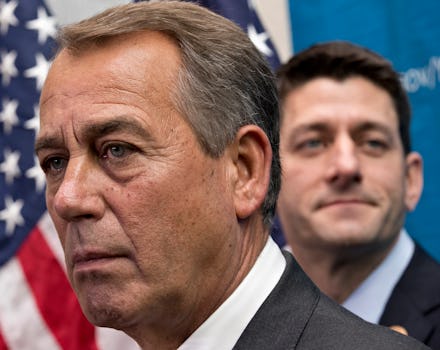John Boehner Is Falling on His Sword to Save Paul Ryan — But Will It Work?

Speaker John Boehner (R-Ohio) is going out with a bang.
The White House and congressional negotiators announced Monday they had reached an agreement on a budget deal to avert a government shutdown and raise the nation's debt limit. The deal would effectively remove two of the most contentious weapons from the arsenal of the conservative wing of the House Republican caucus, and give Rep. Paul Ryan of Wisconsin, the all-but-certain incoming speaker, two years respite from the bruising budget battles that plagued Boehner's tenure.
But the dimensions of the deal — particularly the fact that it will need support from Democrats to pass, as well as the timing of its unveiling — point to a larger dynamic playing out within the Republican Party, with effects that will influence both the internal politics of the GOP and the race for the White House.
What's in the deal: The agreement between GOP leadership and the White House will extend the federal budget until after the 2016 presidential election, providing both domestic and defense agencies with an additional $80 billion in exchange for cuts spread across the remainder of the budget.
The two-year deal will be the longest of its kind since the Budget Control Act in 2011, which set caps on government spending that were subsequently restricted even further under sequestration in 2013.
Since 2013, Republicans have repeatedly attempted to increase defense spending while keeping domestic spending capped. The Obama administration has held firm to the requirement that domestic and defense spending be linked, with budget constraints or increases affecting both equally and simultaneously.
Easing budget constraints on domestic programs is a huge win for the Obama administration. The concession by a previously stubborn GOP leadership signals a willingness by the party to sideline the more conservative wing, and underscores the potential power shift among House Republicans as the speakership transitions from Boehner to Ryan.
The deal resembles the proposed budget agreement worked out between Ryan and Sen. Patty Murray (D-Wash.) in 2013. If passed, the plan will resolve critical domestic issues like Social Security funding and Medicare fees in exchange for cuts elsewhere in those programs and others.
The deal will increase funding $50 billion in the first year and $30 billion in the second. While the Defense Department will see more money than domestic programs under this deal, the agreement still delivers nearly 90% of the domestic sequestration relief the president requested in his 2016 budget.
What happens next: Inking this agreement will allow Boehner to hand off the House to Ryan with a two-year stay on politically bruising fiscal fights and give the presumptive speaker an opportunity to unify his caucus around other policy issues and priorities.
Ryan is already using the announcement to bolster his right flank, attacking Boehner for cutting a deal behind closed doors and promising that "under new management we are not going to do the people's business this way."
While Ryan's crocodile tears may play with the press and conservative voters, it's important to remember that Ryan has the leverage to prevent this deal from happening as a condition of his speakership. His willingness to let this deal go through with little more than lip service in opposition suggests he is turning his attention to uniting a disjointed GOP House and attempting to heal the divisions that grew under Boehner.
The risk for Ryan is that the public and internal fights that brought down Boehner are merely symptomatic of a much deeper divide in the Republican Party that will persist regardless of who sits in the speaker's chair. How that division manifests itself during the two-year respite from fiscal debates will be telling, both for congressional politics and 2016 presidential candidates.
While no "Grand Bargain," this deal is undoubtedly Boehner's swan song as he heads out the door. Throwing far-right fiscal conservatives overboard will do little to shore up Boehner's legacy among his detractors, but the sacrifice of said legacy may provide Ryan with the necessary cover to unify a disjointed and raucous caucus moving forward. Whether he's able to successfully do so, however, remains an open question.